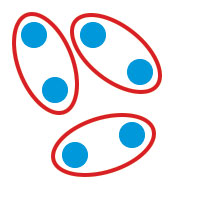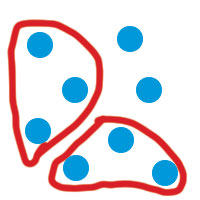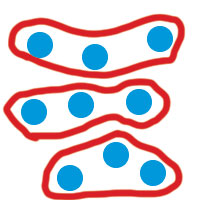A remainder is the amount you have left over when you divide one number into another number.
Let's look at \(6\) divided by \(2.\) Here are \(6\) circles.

Divide them into groups of \(2.\) Each group of \(2\) is circled.

There are \(3\) groups, so \(6\) divided by \(2\) equals \(3.\)
Now let's try dividing \(7\) by \(2\). Here are \(7\) circles.

Divide the circles into groups of \(2.\)

There are \(3\) groups and \(1\) circle is left over. So, \(7\) divided by \(2\) equals \(3\) remainder \(1.\)
We say one number divides another number if it leaves no remainder. We also say a number is divisible by another number if the other number divides it.
Let's check if \(3\) divides \(8.\) To divide \(8\) by \(3,\) here are \(8\) circles.

Draw the circles in groups of \(3.\)

There are \(2\) groups of \(3\) and there are \(2\) circles left over. So, \(8\) divided by \(3\) equals \(2\) remainder \(2.\) There is a remainder so \(3\) does not divide \(8.\) In other words, \(8\) is not divisible by \(3.\)
Let's check if \(3\) divides \(9.\) Here are \(9\) circles.

Draw the circles in groups of \(3.\)

There are \(3\) groups, so \(9\) divided by \(3\) is \(3.\) There is no remainder, so \(3\) divides \(9.\) In other words, \(9\) is divisible by \(3.\)







